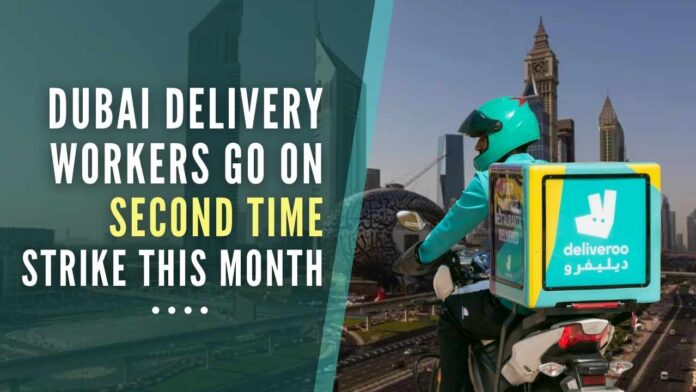
Workers demand more due to fuel price hike
Food-delivery workers protesting meager pay and inadequate protections on Tuesday have walked off the job across Dubai. This is the second strike and the first strike was on May 1, which is the rarest incident in Gulf countries where strikes are considered a serious offense and dissent against governments. Due to the surge in fuel prices, food-delivery workers and many in the service sector are demanding a hike in their charges for the past few weeks. The majority of the workers are from Asian countries like India, Pakistan, and Bangladesh.
News agency Associated Press reported that the foreign workers contracted by Talabat, the Middle East unit of Delivery Hero, began their walkout late Monday after organizing on social media, crippling the application’s services. As fuel prices surge, many said they were pressing for a modest pay increase from their current rate of $2.04 per delivery — a wage less than what sparked another extremely rare strike among contractors for delivery service Deliveroo last week. The first strike started in Deliveroo, a UK-based App-based food delivery firm.
Deliveroo drivers now make $2.79 per delivery after the walkout forced the UK-based company to backtrack on its plans to slash workers’ pay and extend their hours. Strikes and unions remain illegal in the United Arab Emirates, where the subject of labor standards has grown contentious in recent years. Videos shared on social media showed scores of Talabat riders gathering in lots beside their parked motorcycles at dawn. It was not clear how many riders took part in the strike, which caused Talabat to acknowledge some “operational delays” on Tuesday.
Talabat, owned by Germany-based Delivery Hero, confirmed the work stoppage in a statement to The Associated Press, saying the company was “committed to ensuring riders can continue to rely on our platform to provide for their families.” Up until last week rider pay satisfaction was well above 70%,” the company added, without disclosing how it came to that number. “Yet, we understand economic and political realities are changing constantly, and we will always continue to listen to what riders have to say,” the company in a statement.
Several striking Talabat riders say they hoped to secure a raise to roughly $2.72 per delivery, especially as they’re squeezed by spiking gas prices that they pay out of pocket. Many drive some 300-400 kilometers (190-250 miles) a day. Riders also described a mountain of other costs draining their salaries, including visa fees to contractors who secured their jobs in Dubai, toll charges, regular motorcycle maintenance costs like oil changes, and hospital expenses. Contractors do not provide drivers with adequate accident insurance, drivers say, even as many frequently crash on Dubai’s dangerous roads.
That leaves delivery workers, part of Dubai’s vast foreign workforce mainly from Africa and Asian countries such as India and Pakistan, with little cash to pay rent and send back home to families they support.
As it seeks to burnish its image as a cosmopolitan haven for ex-pat workers, the UAE has faced persistent criticism from human rights groups over the long hours, tough conditions, and relatively low pay endured by the country’s manual laborers. Strikes over pay disputes have occurred sporadically in the past, although workers face deportation and prosecution for outbursts of dissent.
Authorities say the country has made labor reforms and offers many workers better money than they would find amid poverty, and sometimes conflict, back home. With companies struggling to find staff after the pandemic triggered mass lay-offs of manual laborers across Dubai, delivery contractors are feeling emboldened in the emirate’s tight labor market, analysts say. Gulf Arab countries are also increasingly competing to attract ex-pat workers and professionals.
“The full extent of the damage to the labor market has not been reckoned with,” said Ryan Bohl, a senior Middle East analyst for U.S. Risk intelligence firm RANE. “Striking workers know they can’t be quickly replaced.” Khan, a 24-year-old Talabat driver, and breadwinner for his family of nine in Peshawar, Pakistan, said he can barely make ends meet in Dubai — even though he hasn’t taken a day off in three months and works 15 hours a day. He has been struck by cars twice and injured his foot on the job, he said, but could never afford to get treatment.
“I’m not striking for me or for my friends. I know it’s not good for us,” he said, asking that he only be identified by his family name for fear of reprisals. “It’s for the future. For guys like us, coming here to Dubai,” said Khan.
[with inputs from Associated Press]
PGurus is now on Telegram. Click here to join our channel and stay updated with all the latest news and views
For all the latest updates, download PGurus App.
- Elon Musk postpones India visit. Non-clarity in Tesla partner and Starlink license might be the reasons - April 20, 2024
- NIA confiscates Pak-harboured Khalistani terrorist Lakhbir Singh Rode’s key aide’s land in Moga - April 19, 2024
- Prime Minister Narendra Modi: A Gujju businessman who does not invest his precious time for a losing battle - April 13, 2024










